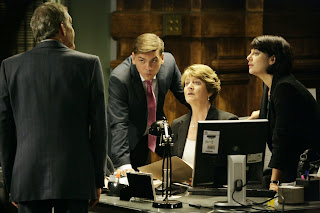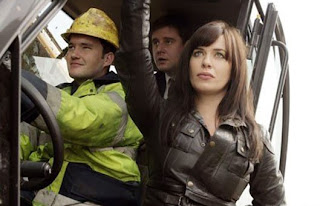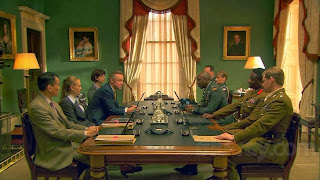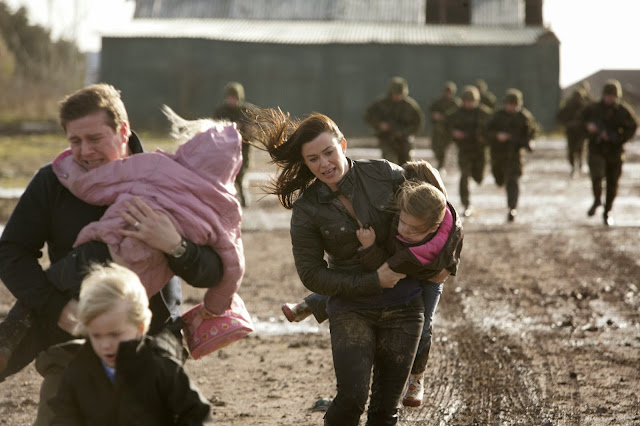For once I’m going to be completely up front here: if there
is even the slightest chance that you plan on watching Torchwood: Children of Earth and you wish to remain unspoiled, then
you should stop reading right about HERE. Because we’re going to spoil the crap
out of it in the rest of this article.
And I should point out that if you don’t want to watch Torchwood: Children of Earth, you’re
wrong and you need to go sit in the corner and think about what you did.
Everybody good? Awesome.
So, today we’re going to talk about Torchwood: Children of Earth, in case you didn’t catch that. While
nominally Children of Earth is the
third season of Torchwood, a spinoff
of the ever popular Doctor Who, it
really stands alone both as a season and as a show in and of itself. Sure, the
characters appear again later, and the continuity does fit within both shows,
but it’s a completely different animal. For starters, it’s a miniseries. There
are only five episodes, each of which follows a single day during the invasion
of Earth by a hostile alien species. We meet new characters, deal with
different problems, and overall see a very surprising side of the Doctor Who/Torchwood universe.
We also see some of the hands down best writing ever to
grace the television screen. I’m really not kidding about that. I genuinely
think this is one of the best things I’ve ever seen. In my life. And I am picky
as hell.
Why do I love it so much? We’ll get into the actual plot in
a bit, but I think the answer is pretty simple. I love Children of Earth because it presents us with an utterly
unflinching view of humanity, good and bad, in the face of crisis. Because the
monsters, far from representing just one singular social problem, represent all
of them. The monsters are us, our greed, our self-righteousness, our inflexible
wills, and our casual disregard for each other. The aliens might be the
villains, but we’re the bad guys. All of us.
Did I mention that it’s incredibly dark? Because it is.
Children of Earth
picks up a couple of months after Torchwood
season two ends. (SPOILERS, in case you missed it the first time). Tosh (Naoko Mori) and Owen (Burn Gorman) are both dead, and Jack (John Barrowman), Ianto
(Gareth David-Lloyd) and Gwen (Eve Myles) are left reeling from the loss. It’s
pretty much business as usual for the team, even going so far as to show them
trying to find new members to possible recruit, when a terrifying event streaks
across the globe. All at once, every child on Earth stops – dead still – for a
minute. Then, in unison, they all say the same thing. In English. “We are
coming.”
Naturally, this sparks off a terror all across the world.
What is happening? Who is coming? How the hell did they hack into our children?
For all that it was big and scary, the kids seem to be fine afterwards. What is
going on?
But someone knows. Specifically, Jack knows, and so does the
British government. At the Home Office, John Frobisher (Peter Capaldi) seems to
be unfortunately aware of who is coming, and as the show progresses we find
that he’s not the only one. Because “we” have been here before, and as a
result, a few select people know what’s coming next.
It’s not good.
Jack, who is as you might remember immortal, recalls the
last time this entity made contact with the British government: back in the
1960s. They call them the 456, because that’s the frequency on which the
creatures contact Earth. Back in the sixties, the 456 made a trade with the
British government. The 456 would send a cure for the Indonesian Flu, which
would otherwise kill millions of people, and in return, the government would
give them children. Twelve, I believe.
Jack is the only one of the soldiers left alive, and since
the government would very much like this information not to get out, they try
to kill him. That doesn’t go that well, and now Torchwood is on the case,
struggling to figure out what the 456 is doing, what they want, and how to stop
the government from rolling over like they did last time.
Also, Gwen and Rhys (Kai Owen) have just found out that
they’re going to have a baby, and Ianto is frustrated by his relationship with
Jack, while he also frets about his sister and her children. Jack’s got his own
worries, when he realizes that his grandson is precisely within the target age
group.
Lots more plot things happen, of course, but the basic gist
is that the 456 demand more this time. A lot more. They want ten percent of all
the children on Earth. If they don’t get them, they’ll destroy the human race.
And the worst of it is, the governments of the world agree.
Like I said, there’s a lot more going on here, and some even
more horrifying stuff that we’ll cover in a second, but I think you’ve got the
basics now. When push comes to shove, the people of the world back down. And
the worst of it is, are they exactly wrong?
I mean, if you think about it, they are bargaining for the
safety of everyone. Yes, they’re sending millions of children off to who knows
where, but they’re also saving literally everyone else on the planet. Is that
so wrong?
Yes. It is.
As the show progresses through the thorny issues that arise,
it gives us a simple, but ultimately true answer. If we do not fight, we are
not truly alive. If we don’t fight obvious evil like this, then what right have
we to our children anyway?
When they decide to give the children over, the people of
the council all agree that it can’t be, well, their children, right? So they make a plan. A plan to take the
children no one will miss. The low-performing kids. The ones no one likes. The
losers. Kids like Ianto’s niece and nephew. Which is, sad to say, all too
plausible.
I mean, it’s kind of easy, right? It makes sense. It’s not super
surprising to think of. Of course, if they were going to give in, then these
wouldn’t be the people to take the hard cuts themselves. Of course they would
use it as a chance to clean up the country. Of course they go after the lower
income families, the immigrants, the undesirables. Of course.
It’s human nature writ large and frightening across the sky.
The 456 in this story are monsters. There’s really no
question about that. Later in the story, it’s revealed that they kept the
children from the 1960s, perfectly preserved. Why? Because the 456 needed them,
wanted them. They use the children as drugs. They use them to get high. I’m not
sure there’s anything more immediately horrifying than that.
But for all of the obvious evil in the 456, they aren’t the
villains of this story. How could they be? To them, we’re ants. Ants with
hallucinogenic properties, apparently, but still. They don’t care what happens
to us, we’re a means to an end. And in a strange way, that makes them less
villainous. Oh, don’t get me wrong, they totally deserve their awful end, but I
don’t feel like they’re the ultimate bad guys in this. We are.
We’re the ones who let it happen. Who don’t fight. Who sit
placidly and allow the most vulnerable among us to be taken, and who calmly
agree when our government tells us to roll over and pretend we can’t see. It’s
the sad fact of human nature. When given an opportunity to do good, but at
great personal cost, or to do nothing, at potential gain, nearly no one will do
good.
There is a flip side. There’s also Torchwood. Torchwood
knows the stakes. They manage to infiltrate the building where the 456 are
being held and try to negotiate. Actually, they more try to threaten and
intimidate them, but that ends terribly and the 456 kill everyone in the
building. Including Ianto and Jack. Jack wakes up. Ianto doesn’t.
So Jack already knows the risk. He’s already lost someone he
loves dearly. And when the idea comes of how to defeat the 456 (use the same
frequency they used to hijack the children and basically make their heads
explode) he is the first to realize that it has a cost. It has a high cost: his
grandson, Steven.
They need a conduit to send the message back to the 456. It’s
the only way to save Earth. And it involves sacrifice. The same sacrifice,
ultimately, that they rejected when it was all the children. For the sake of
many, one. Steven dies. And Jack knows it’s his fault. Because it is.
I love this story because there’s no right answer here.
There’s nothing that makes it all okay. Nothing’s okay. It’s all horrifying and
terrible. But that’s kind of the point. You want to talk about monsters who
represent something in the culture, well, sometimes it’s important to talk about
the culture and how it can be a monster too. For all that the 456 clearly
represent corruption and human degradation, they also aren’t the real evil
here. We are. We’re the bad guys. And that’s important.
Sometimes there really isn’t a right answer. But that doesn’t
mean that there aren’t still wrong answers. Just because we can’t see the good
does not allow us to give in to the bad. The real monster in Children of Earth is Earth itself. Which
is, in its own way, good. Because if we can truly see this, just this once,
then maybe we can change.
I hope.








No comments:
Post a Comment